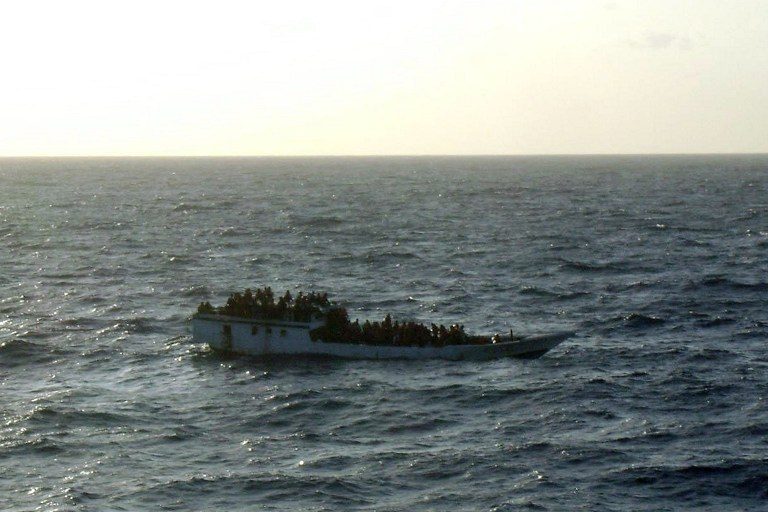SUMMARY
This is AI generated summarization, which may have errors. For context, always refer to the full article.

SYDNEY, Australia – As Europe struggles to deal with a surge in migrants pouring across the Mediterranean, Australia has gone nearly 18 months with virtually no asylum-seeker boat arrivals and no deaths at sea.
But observers warn that Australia’s hotly contested policy of turning back boats offers no model for the European Union, arguing it is immoral and probably illegal under both EU and international law.
Pressure on the EU to tackle its mounting crisis has escalated after more than 700 people were feared drowned when an overcrowded boat capsized off Libya at the weekend, with calls for a special summit.
But can it learn any lessons from Australia? Immigration Minister Peter Dutton on Monday said he would not be lecturing Europe on what to do.
“That is an issue for those governments, not for us to provide advice on,” he said.
But he added: “The lessons we’ve taken is that the turnbacks (of boats), where safe to do so, has worked.”
Soon after it came to power in September 2013, Australia’s conservative government launched the military-led Operation Sovereign Borders to halt a flood of boatpeople arriving almost daily under the previous Labor administration.
Under the new policy, navy ships intercept boats carrying asylum-seekers and turn them back to where they transited from, mostly Indonesia, or send those on board to offshore processing centers in Papua New Guinea and Nauru in the Pacific.
Even if proven to be genuine refugees, they are denied resettlement in Australia and left with the option of either returning home or living in PNG, Nauru, or even impoverished Cambodia, under bilateral agreements.
There have been no deaths at sea en route to Australia for 17 months, after some 1,200 perished under the previous Labor policies, Dutton said.
But refugee and rights advocates say the current policy has simply shifted the responsibility to other countries.
“The government is claiming victory but the reality is that boats not arriving doesn’t mean that they are being stopped,” Jane McAdam, an expert in international refugee law at the University of New South Wales, told Agence France-Presse.
“It is simply pushing the problem onto other countries. Boats will continue to come as long as the root causes of displacement remain unresolved.”
Desperate situation
The migrant wave heading to Europe, mostly through Italy, has swelled on the back of the worsening security situation in Libya – the staging post for most of the crossings – and the EU is looking at ways to respond.
EU interior ministers have broached the possibility of setting up asylum-processing facilities in third countries as a way to deal with the flood of people fleeing conflict in the Middle East and North Africa.
Many of the migrants heading to EU shores are in any case not claiming asylum, but hoping to melt into the black-market workforce.
And the third-country option is undermined by chaos in many nearby nations, while others are rife with human rights abuses.
McAdam said that at any rate, the Australian model was flawed and not applicable to the EU.
“Australia is not part of any regional human rights system and some of what it is doing would be ruled illegal under the European Convention on Human Rights,” she said.
The Australian operation has been slammed by the United Nations, which says Canberra has flouted obligations as a signatory to the 1951 Refugee Convention to ensure people can access asylum.
Canberra has also been heavily criticized over evidence of abuse at its offshore detention camps, and for keeping children locked up.
Human Rights Watch Australia director Elaine Pearson told Agence France-Presse it would be disastrous if the EU adopted similar offshore processing and started turning back boats.
“Part of the problem is the EU is not providing enough resettlement places given the scale of the problem,” she said, adding that the Australian model of offshore processing was “impractical and cruel and inhumane by locking people up in isolated dismal conditions”.
“It may be effective in diverting the problem onto other countries but it fails to address the fact that people need to flee persecution and go somewhere.”
Australia will not reveal how many boats it has turned back, citing operational security.
The EU currently only runs a limited search-and-rescue interception operation in the Mediterranean. A previous one was scaled back after Italy failed to persuade its European partners to help meet the growing operating costs.
There were also divisions over whether the rescues were encouraging migrants to attempt the crossing. – Martin Parry, AFP / Rappler.com
Add a comment
How does this make you feel?
There are no comments yet. Add your comment to start the conversation.